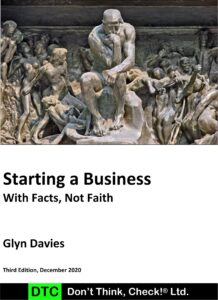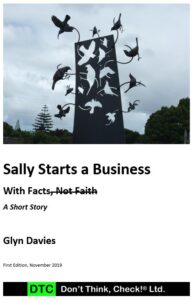
I want to briefly discuss plagiarism, “the representation of another author’s language, thoughts, ideas, or expressions as one’s original work.” https://en.wikipedia.org/wiki/Plagiarism, Wikipedia.
Plagiarism is intellectual theft. It is an act of misrepresentation, of representing capability, skills, and knowledge the perpetrator does not possess. Plagiarism is in short, lying, and that’s not even touching the issues of breaching copyrights.
The document from which the following quote is copied has, according to the online writing assistant Grammarly, 20% plagiarism; another document from the same author had 26% with almost identical document structure to the original. The example below is not the only instance in the same document. Nowhere in said documents is there a reference to the original documents and authors.
Original Post: Reinventing Your Career in the Time of Coronavirus, Herminia Ibarra, April 27 2020, HBR.org.
“The golden rule of networking for career change has always been to mobilize your weak ties — that is, the relationships you have with people you don’t know so well or don’t see very often, in order to maximize your chances of learning things you don’t know already.”
Concerning Post: Reinventing your career, May 8 2020, Author withheld.
“The golden rule of networking for career change is to mobilise your weak ties — that is, the relationships you have with people you don’t know so well or don’t see very often, in order to maximise your chances of learning things you don’t know already.”
Ironically, providing references, that is evidence of research and the existence of like-minded authors adds credibility to documents. Leaving references out could indicate that you are a lone and deluded heretic.
Hypocritically, the concerning posts are in a PDF format that does not allow easy copy and pasting.
Plagiarism is a big deal, not only for the reasons stated previously such as lying, but it is not recognising and providing credit to the original author(s), those who did all the hard work in the first place. As with other forms of dishonesty, we need to take plagiarism seriously. Would you knowingly work with someone who steals? And if you have hired someone who steals, are you paying them too much? If they are capable of dishonesty, where does their dishonesty start and stop?
For an example of the lengths I go to research topics and provide credit, see Covid-19 Roadmap to Recovery.
Addendum
On Wednesday 4, August 2021, Katherine emailed to inform me of an article that had reviewed plagiarism tools, one of which was Grammarly – https://www.websiteplanet.com/blog/best-plagiarism-checking-tools/.
I concur with the article’s assessment of Grammarly, in that Grammarly doesn’t always do a great job of partially plagiarised content, even if it is relatively obvious to me, i.e., is virtually identical.
Thank you Katherine for taking the time and effort to reach out, I really appreciate it.
Glyn.



